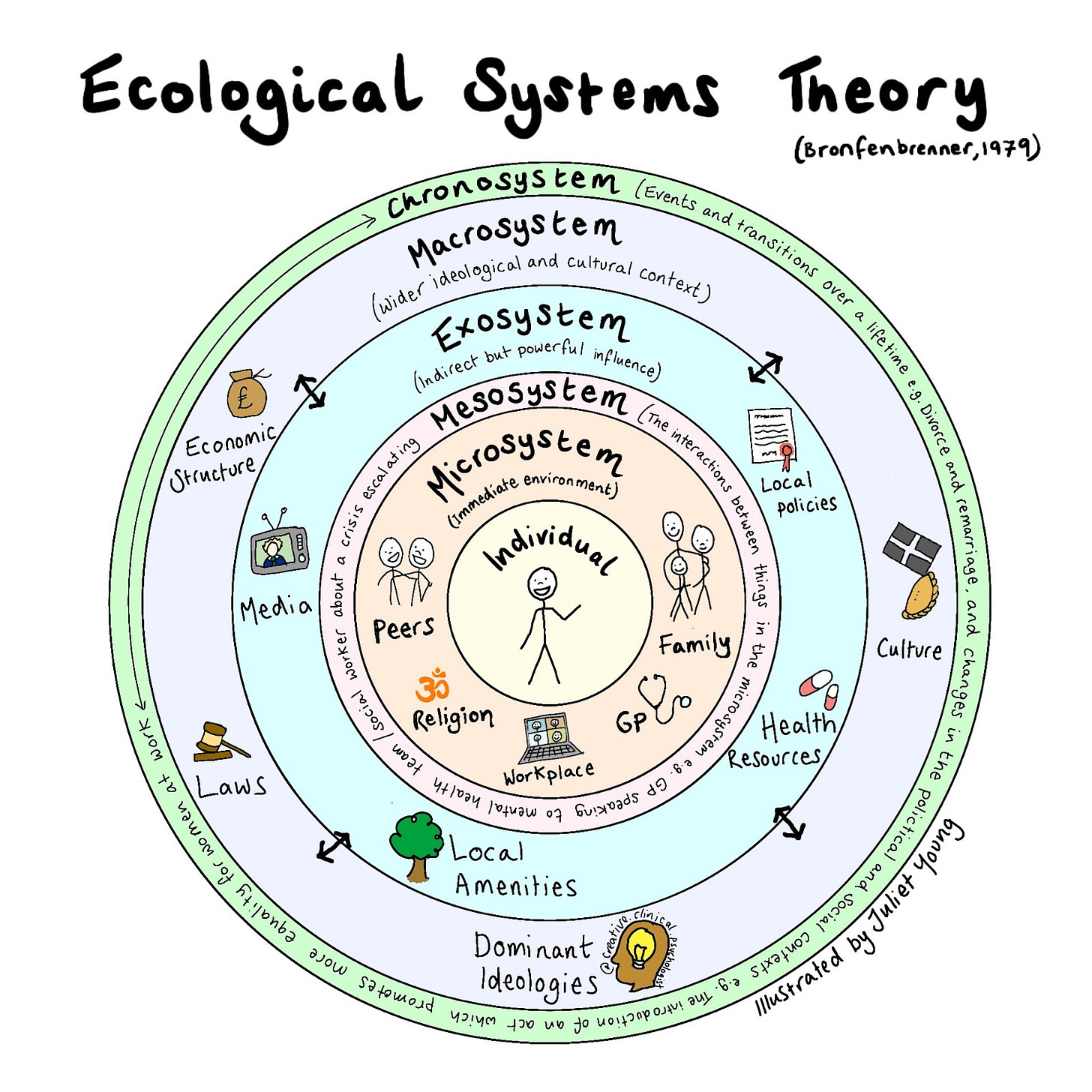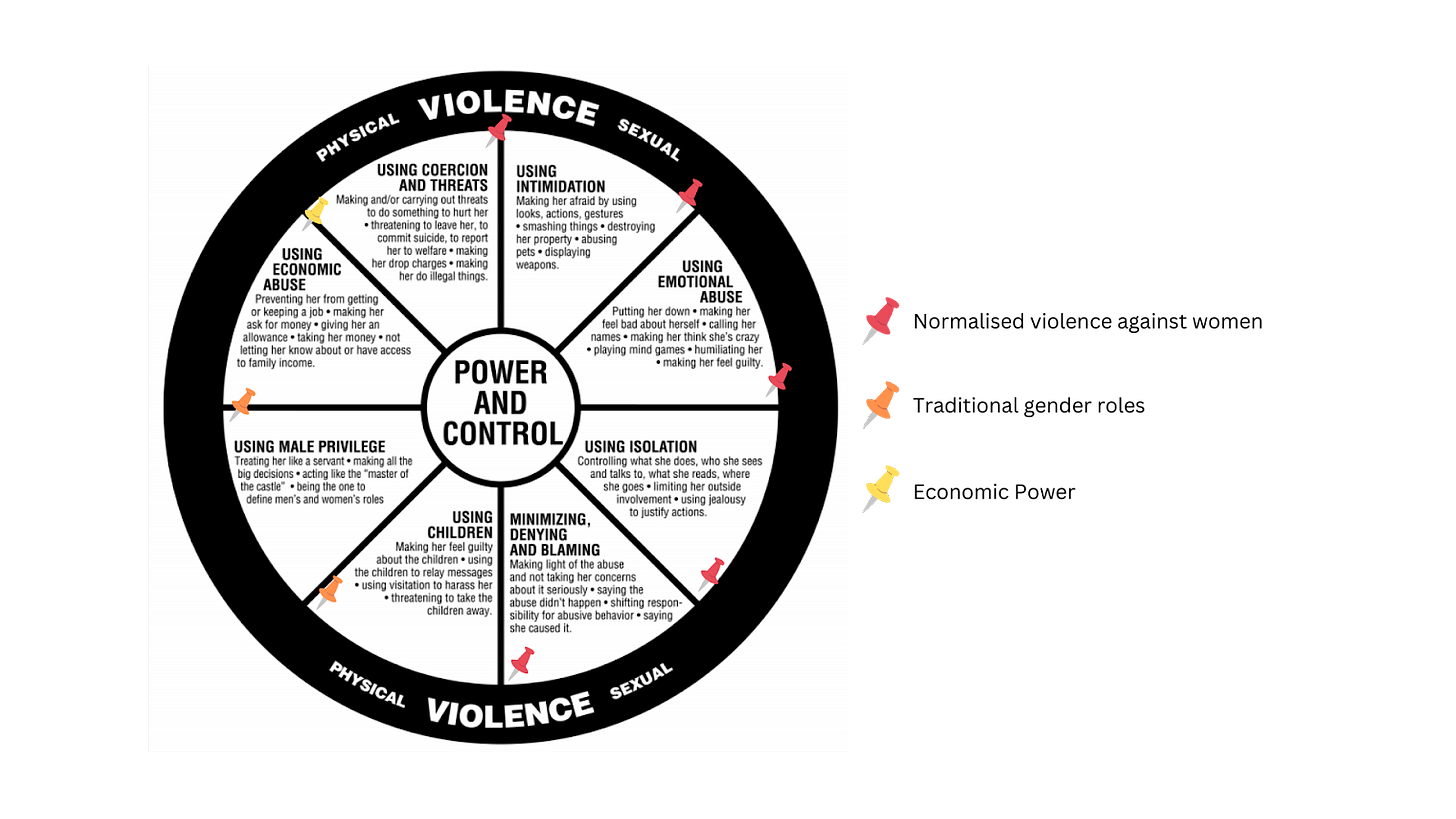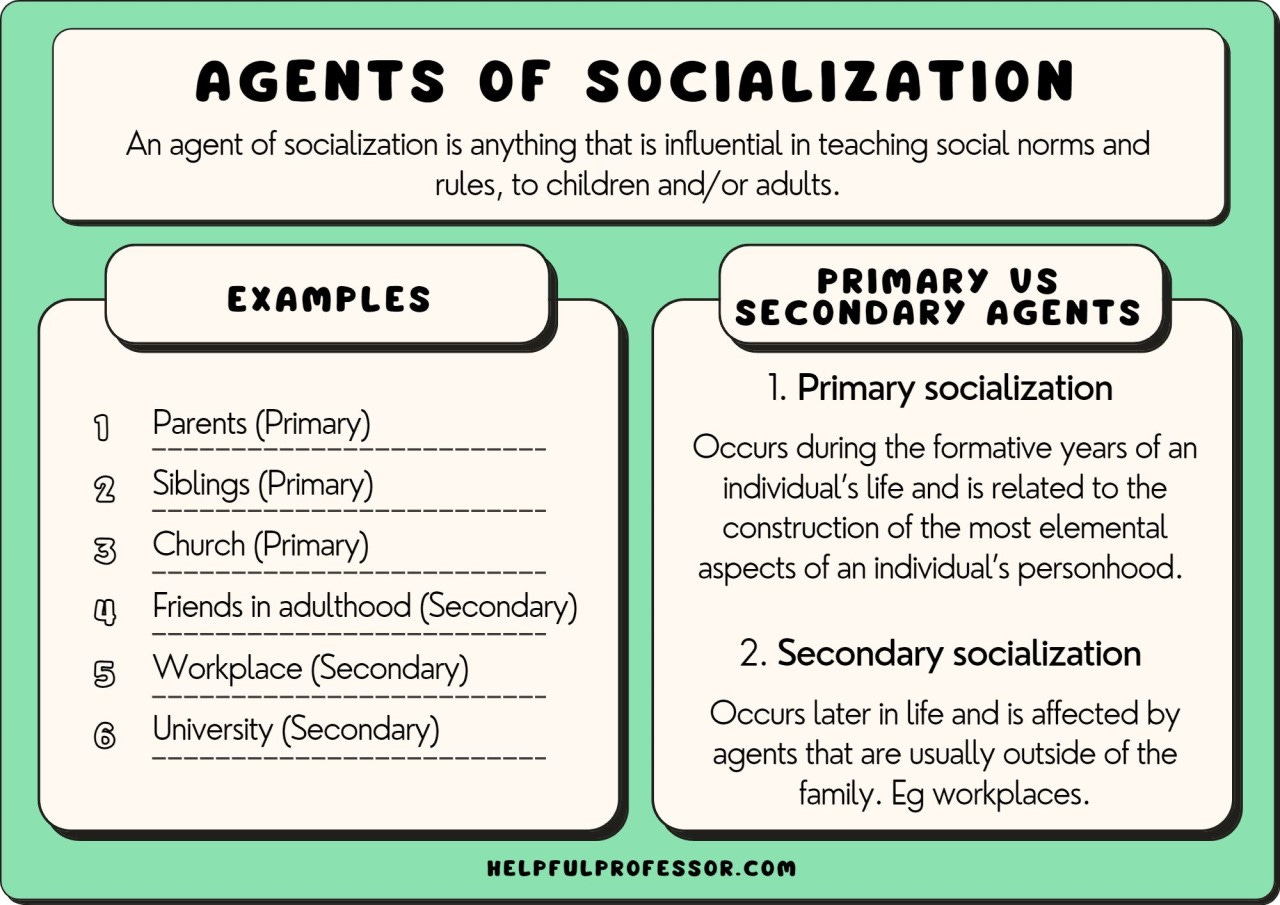Guest Post: How to Love in the Patriarchy
if we’re ever going to achieve the goal of gender equity, we must examine the role systems play in it.

The “Love tape” is an essay series discussing the topic of love in all forms. For the previous post, click here. Want more? Become a paid subscriber and get access to the “Un-trashed Podcast” For the month of February, we will be doing a series titled, “Things I learned from the People who Dumped me”
Content Warning and Disclaimer: This article contains non-graphic mentions of various forms of violence against women, including domestic violence, sexual violence, and femicide. There are also non-graphic mentions of mens mental health issues including suicide.
What is Patriarchy: Patriarchy is a social system in which positions of dominance and privilege are primarily held by men.
“Women are from Venus, men are from Mars”, they say, however the truth is far less mythical. The truth is we live in a patriarchy and have been systematically pitted against one another for thousands of years!
When asked to contribute, I immediately knew I wanted to share what I’ve learnt about the power dynamics between heterosexual men and women as a cishet woman living in a patriarchy, and how this impacts our intimate relationships.
When it comes to the goal of achieving gender equity and justice, I feel it’s important for women to understand the detrimental systemic impacts of dating men in a patriarchy, and how we navigate them. This is also important for men who want to work with women to dismantle these power dynamics, the systems that underpin them, and instead build systems and relationships with women based on shared power, mutuality and reciprocity.

In feminist and liberation spaces, we talk about dismantling patriarchy and oppressive systems, which sounds rather abstract and like something that happens outside of us. But systems are ecological, meaning there is an interconnected relationship between living things and their environment (aka systems).
Systems exist at a chrono, macro and micro level - the chrono being historical factors and changes that shape people and culture over time, the macro being our political and social institutions, the micro being our family, peers and communities. From an ecological systems view, the work of dismantling oppressive systems needs to happen within us as well as without, because we are socialized within these systems and are shaped by them.
Socialization is the process by which we learn and internalize the social and cultural ideas, beliefs and norms of the dominant culture. A process that takes place throughout our lives but is especially pervading during our formative years.
The “agents of socialization” are the people and institutions that shape our sense of self, our values and place in the world, and our view of others. They are what embed and imprint the ideas, beliefs and norms of the culture upon us.
As a social, cultural, political and economic system, patriarchy has been in place for thousands of years. It was created and is upheld by structural oppression and power dynamics that create unequal power between people, based on the difference of their identity such as race, gender, class, sexual orientation and so on. Those in power maintain dominance through various forms of force and violence reinforced through institutions, policies, systems, ideas, beliefs and norms that privilege those in power and exclude those who are not.
With all this in mind, if we’re ever going to achieve the goal of gender equity and justice, we must examine the role systems play with constructing power dynamics that manifest as gender-based disparities, including in intimate relationships. We must understand how we’ve normalized patriarchy, the harmful effects this has on men and women, and how to productively navigate them.
Below I unpack this, as I address the following questions:
What are the social and cultural ideas, beliefs and norms of patriarchy?
How have we come to accept patriarchy as the norm?
How does patriarchy harm us?
How does this shape the power dynamics between men and women in intimate relationships?
How can women navigate and counteract these power dynamics and their effects?
Let’s get to it…
What are the social and cultural ideas, beliefs and norms of patriarchy?
Some of the shared core tenants of patriarchy globally include:
Male dominance and superiority over women
Traditional gender roles with men as breadwinners and women as homemakers
Restrictions and barriers to women's participation in the public sphere
The belief men should have control over women's bodies and sexuality
The idea women are inferior to men in terms of intelligence, capability, and worth
The normalization of violence against women and the minimization of its impact
The notion women's primary role is to bear and raise children
The emphasis on men's sexual prowess and women's sexual modesty
The unequal distribution of wealth and resources between men and women.
It goes without saying these are all incredibly oppressive ideas and beliefs that we must unlearn, and create new narratives that aren’t oppressive and harmful towards women.
How have we come to accept patriarchy as the norm?
Patriarchal values and norms are embedded in our society and culture, and are often unconsciously perpetuated by both men and women.
Men are conditioned to normalize patriarchy through a variety of social forces. We’ve touched on socialization, and the role of social institutions. However, men also learn about patriarchal values from other men. They benefit from patriarchy through increased access to resources, power, and privilege, enforcing the idea of male dominance and supremacy. They will internalize patriarchal norms in order to prove their masculinity and avoid being perceived as feminine or ‘weak’. Many men project patriarchal norms onto one another, and shame or humiliate men who don’t conform. I’m reminded of the bell hooks quote from her book The Will To Change: Men, Masculinity, and Love - where she profoundly states:
“The first act of violence that patriarchy demands of males is not violence toward women. Instead patriarchy demands of all males that they engage in acts of psychic self-mutilation, that they kill off the emotional parts of themselves. If an individual is not successful in emotionally crippling himself, he can count on patriarchal men to enact rituals of power that will assault his self-esteem.”
Unfortunately, men may not be exposed to alternative perspectives that challenge patriarchal norms, leading them to believe they are natural and immutable.
Women also normalize patriarchy through socialization. They face a pressure to conform to patriarchal norms through social institutions, peers and family, this includes adhering to patriarchy’s definitions of womanhood, femininity and beauty standards. By objectifying and subjecting women to the ‘male gaze’, women are celebrated and rewarded when they perform to these standards, and punished and dehumanized when they don’t. Often women will internalize patriarchal norms by having an economic dependence on men due to limited opportunities or increased barriers to participating in public and political spheres.
All of this leads to internalized misogyny/misogynoir. Internalized oppression of any form is a trauma response, a way we keep ourselves safe from our oppressors. American historian and professor John Henrik Clarke once said “To hold a people in oppression you have to convince them first that they are supposed to be oppressed.” When reading this for the first time, I couldn’t help but think how applicable it was to the way internalized oppression leads us to upholding and perpetuating our own oppression, something that deeply harms us.
How does patriarchy harm us?
Whilst patriarchy does not oppress men based on their gender, it is damaging to men in multiple ways. One of the significant harms is the pressure to be ‘protectors and providers’. Not only is this dehumanizing as it reduces men to mechanisms of productivity, carrying this burden alone can be a source of great stress.
Rigid definitions of masculinity can prevent them from expressing their emotions, interests, and values. This can lead to difficulty in forming meaningful relationships, communicating effectively, and developing emotional intelligence. By reinforcing traditional gender roles, men are denied the opportunity to explore and express their full range of talents, interests, and abilities. Traditional gender roles also lead to the unequal distribution of labour and caregiving, denying men their benefits such as increased empathy, emotional intelligence, and relationship-building skills.
Patriarchy promotes a culture of violence and aggression, resulting in higher rates of violence against women. Violence against women is a pervasive human rights violation rooted in gender inequity. The United Nations Women's 2022 Report on Femicide reveals every 11 minutes, globally a woman is killed by a man, typically a family member or intimate partner, making home the most dangerous place for women.
All of these factors contribute to increased mental health issues among men, such as depression, anxiety, substance abuse, and even suicide.
Internalizing patriarchal norms also has serious consequences for women's mental, physical, and emotional well-being, with femicide and an increased risk of violence being one of the leading threats to women's health and lives globally.
Internalized patriarchy may also lead women to limiting their opportunities for education and career advancement, they may normalize violence and abuse against women, create obstacles to forming healthy relationships, experience body image issues and eating disorders, and form limiting beliefs about their reproductive rights.
Women's bodies carry the imprint of generations of subjugation and violence, which may manifest in the form of chronic stress, reproductive, autoimmune and hormonal issues, as well as weight-related issues, trauma related neurodegenerative disorders, and other health-related issues.
Patriarchy subjugates and socializes women in a way that leads women to believe they deserve less. Even when women find the internal drive to demand more from men and society, they will face various systemic barriers preventing them from gaining access to the resources and support needed to self-actualize and fully liberate themselves.
It must be acknowledged due the interlocking nature of white supremacy, patriarchy, imperialism and capitalism each of these issues disproportionately affect Black, Brown, Indigenous, Disabled, Queer and Trans women.
All of these factors are what makes relationships between men and women systemic and political, and points to why we need to dismantle these power imbalances both within and without.
Which brings us to the next question to unpack…
How does this shape the power dynamics between men and women in relationships?
It is clear patriarchal systems are based on the idea of men having more power than women in many areas, including intimate relationships. However, the following three areas are what deeply reinforce men having more power than women in relationships:
Traditional Gender Roles
Men are often assumed the primary decision-maker, with access to greater resources and authority, while women may be expected to assume a more traditional role in the relationship, such as taking on more of the housework and childcare. This can lead to an imbalance of power, labour and responsibility, and to men missing out on their benefits of increased empathy and emotional intelligence.
Normalized Male Violence Against Women
Patriarchal cultures too often encourage violence and aggression, leading to an elevated risk of violence against women. This type of gender-based discrimination is considered the most widespread human rights violation and the consequences of such discrimination can be seen in the increasing incidence of femicide worldwide. Unfortunately, women can often internalize this violence and accept it as normal, making it difficult for them to recognize and challenge abusive behaviour.
Economic Power
Under patriarchal norms men often have more access to resources, power, and privilege than women. This system of economic dependency on men can cause women to internalize these oppressive beliefs, contributing to a feeling of powerlessness in relationships. Men may have more control over finances and major decisions, which can lead to feelings of inequality and can be damaging to relationships.
These factors play a key role in the ways men are able to abuse their power and assert various forms of power, control and dominance over women. Often we think abuse as merely physical, however, there are various forms of abuse, including physical, psychological, economic and spiritual, which all serve to reinforce the status of men as the dominant gender and weaken the autonomy of women.
The Power and Control Wheel is a helpful tool in understanding the various forms of abuse and oppression used by men to maintain control and dominance over women. My edits to the wheel are to point out the overlaps between these three areas, and each form of violence mapped out on the wheel.

Unequal power dynamics between men and women can lead to a lack of respect for women's autonomy, agency, and voice, resulting in tension and conflict. This imbalance of power can also cause feelings of powerlessness and inferiority for women, leaving them feeling unheard and vulnerable to abuse, exploitation, and discrimination.
Which brings us to the final question…
How can women navigate and counteract these power dynamics and their effects?
The truth is, until patriarchy ends, women will continue to experience systemic oppression. Without working towards revolutionary change to overthrow these systems, it is impossible to expect a world where everyone is free and can reach their full potential.
Further, women can try navigating and avoiding oppressive dynamics, however, liars lie, deceivers deceive, manipulators manipulate, cheaters cheat and abusers abuse, and women cannot prevent, control or predict the actions of others, which is why it's on men to be better, and do better.
However, there are ways we can navigate these dynamics, including being discerning of the patriarchal norms men may subscribe to. We should determine our boundaries and expectations when it comes to these norms, and what we will and won’t tolerate.
Women should expect men to strive to recognize the way patriarchy can harm women's health and wellbeing, and make an effort to unlearn these harmful behaviours. We should consider this the bare minimum for men who want to be in a relationship with us.
We should expect men to strive to be supportive and respectful partners and share power with us, including engaging in meaningful conversations about gender roles and power dynamics, and actively creating a relationship where both partners feel equal and valued.
This is a big one…we should expect men to take responsibility for their mental health and the violence they perpetrate against women. This requires engaging in therapy, healing, and/or men's support groups. Women, who are the victims of patriarchal violence, should not be held responsible for healing their oppressors. Women have long shouldered the burden of men's mental and emotional health, but it is important to recognize men must take responsibility for their own healing.
Women should not be treated as objects or resources, but instead viewed as equals. Relationships should be based on mutual respect and understanding, rather than power and dominance.
We should strive for relationships built on mutuality and reciprocity. In a reciprocal relationship, both partners are seen as equals and respected for their individual strengths and contributions.
Should we ever achieve gender equity and justice, it is essential we recognize the power imbalances in relationships between men and women, and take steps to ensure these imbalances do not lead to harm or oppression. Only through collective action and awareness can we begin to dismantle the oppressive systems of patriarchy that affect us all.




Great post; always appreciate bell hooks and the Will to Change :-) I reached a similar conclusion in my own exploration of patriarchy and how it shows up for different genders; sharing here in case of interest: https://citizenstout.substack.com/p/why-does-patriarchy-persist-part